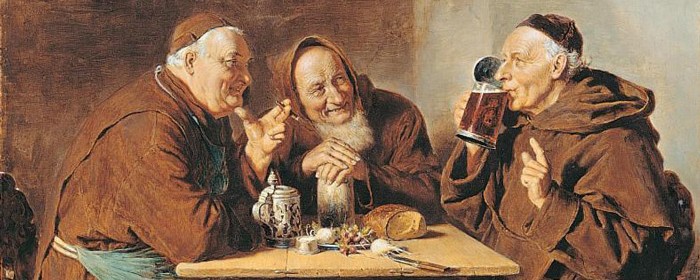In describing his approach to Thomism, Chesterton writes: “The Pragmatist sets out to be practical, but his practicality turns out to be entirely theoretical. The Thomist begins by being theoretical, but his theory turns out to be entirely practical.” The pressing question which is addressed here may seem theoretical, but has immediate import: how do the good things we encounter in this life prepare us for the life to come? St. Thomas would have quite a different answer to our question, but further reflection along Thomistic lines is possible and “practical.” Reflecting on beer, like drinking it, when done prudently and moderately, is worth a taste.
Objection 1. It seems that there will not be beer in heaven, for Saint Paul urges us to purge the old leaven and celebrate instead with the unleavened bread of sincerity and truth (1 Cor. 5:7-8). But according to ancient and venerable custom, yeast (leaven) is an essential ingredient for beer, acting as the efficient cause of fermentation. Therefore, there will be no beer in heaven.
Objection 2. Further, heaven is a place of rest, as St. John recounts from his vision: “Blessed are the dead who die in the Lord . . . they may rest from their labors, for their deeds follow them!” (Rev. 14:13). But unlike wine, which ferments spontaneously, beer requires the work of man. Since toil is a punishment following upon original sin (see Gen 3:17), brewing would have no place in heaven, where all such punishment has been wiped away.
Objection 3. Further, Benjamin Franklin writes, “Beer is proof that God exists, and wants us to be happy.” But in heaven we will need no such proof, as Saint Paul reminds us: “For now we see in a mirror dimly, but then face to face. Now I know in part; then I shall understand fully, even as I have been fully understood” (1 Cor 13:12). Therefore beer, like imperfect knowledge and prophecy, will pass away.
Objection 4: One song claims “In heaven there is no beer / that’s why we drink it here.” But we do drink it here, therefore there is no beer in Heaven.
Objection 5. Saint John writes that “we may be sure that we are in [Christ]: [that] he who says he abides in Him ought to walk in the same way in which He walked.” (1 John 2:5-6) Thus we are called to be imitators of Christ. But Christ never sought to make beer, only wine (see John 2), which signifies the perfection promised by the New Law, as St. Cyril writes. Therefore, beer has no part in the Christian life, even in heaven.
On the contrary, the Lord has explicitly promised there will be wine in heaven: “I tell you I shall not drink again of this fruit of the vine until that day when I drink it new with you in my Father’s kingdom” (Mt 26:29). But, objectively speaking, beer is a more perfect beverage than wine. Therefore, a fortiori, beer will be served at the celestial wedding feast.
I answer that, the new heaven and earth which we await is to be a radical renovation of our present order and not its annihilation. As the Second Vatican Council teaches, “At that time the human race as well as the entire world, which is intimately related to man and attains to its end through him, will be perfectly reestablished in Christ” (Lumen Gentium 48). Since beer is intimately related to man and attains its end through him, it too will be perfectly reestablished in Christ.
Reply to Objection 1. St. Paul is speaking of the old leaven of malice and corruption, and not of saccharomyces cerevisiae.
Reply to Objection 2. Toil is indeed a punishment for the fall, but labor, in itself, is not. Hence, “The LORD God took the man and put him in the garden of Eden to till it and keep it” (Gen 2:15). As Pope Leo XIII writes, “that which would then have been . . . his delight became afterwards . . . the painful expiation for his disobedience.” Thus, in heaven, the task of brewing beer will not be toilsome but delightful.
Reply to Objection 3. In the light of glory, the blessed see God not only through his creatures but immediately, viz., “face to face.” Nevertheless, creatures will more perfectly indicate God than they do on earth.
Reply to Objection 4: This song, as catchy as it is, affirms the consequent, and so does not obtain.
Reply to Objection 5. St. John also recounts Our Lord’s promise: “Truly, truly, I say to you, he who believes in Me will also do the works that I do; and greater works than these will he do, because I go to the Father” (John 14:12). Therefore moral activity is ordered, but not entirely circumscribed, by the particular actions of Christ’s earthly life. At any rate, Christ exercised a kind of craft, viz., carpentry, and beer-brewing is a kind of craft. Hence “craft-brewing.”
✠
Image: A portrait by Eduard von Grützner







